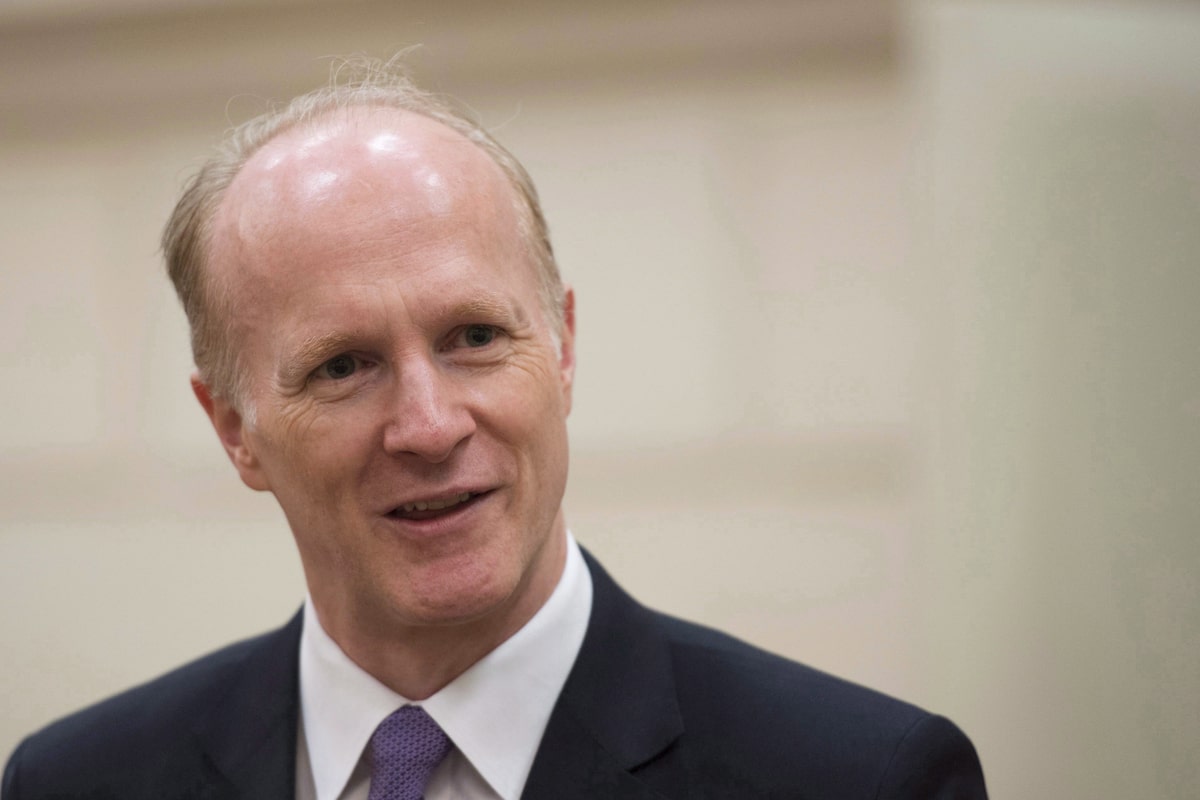Mark Machin, former CEO of CPPIB, pictured in 2016. Mr. Machin co-founded AI-focused growth fund Intrepid Growth Partners, which has invested in three Canadian companies, including CoLab.Adrian Wyld/The Canadian Press
Intrepid Growth Partners, an artificial intelligence-focused growth fund founded by former Canada Pension Plan Investment Board chief executive Mark Machin, has led its first Canadian deal, backing an emerging star in Newfoundland’s fertile tech sector.
The fund invested $52.8-million as part of a $77-million preferred share investment into St. John’s-based CoLab AI Inc., according to an October filing with securities regulators. Investors bought extra equity from existing shareholders.
CoLab, the 19th fastest-growing tech company in Canada, according to Deloitte’s latest Fast 50 list, sells a cloud-based platform for engineers that pulls in data from their e-mails, spreadsheets, notebooks, computer-aided design software and product lifecycle management programs, making it easier to manage collaborative projects.
Its software analyzes 3-D models and drawings, adding automated markups and comments on machine designs and identifying critical issues. Customers include Hyundai, Schneider Electric, Polaris and Johnson Controls.
This year CoLab secured $5.6-million in research and development funding from the Hibernia and Hebron offshore oil projects.
Ex-CPPIB CEO Mark Machin teams with former pension executive to launch AI growth fund
It previously raised US$38-million in two financings led by U.S. venture capital firm Insight Partners.
CoLab was founded by chief executive officer Adam Keating and chief technology officer Jeremy Andrews, mechanical engineering graduates of St. John’s-based Memorial University. Their team took home second prize in SpaceX’s global Hyperloop Pod Design vehicle competition in 2017.
While working on the project, they were frustrated by gaps in computer-aided design and product lifecycle management software they used, figuring they could design a tool to improve them. After doing internships with U.S. companies, they turned down Silicon Valley jobs and returned home to start their company.
“It was always a dream of ours to build a tech company here in Newfoundland,” Mr. Keating said in a 2024 feature posted on the Atlantic Canada Opportunities Agency website. “The working environment in Atlantic Canada has such a great work-life balance compared to many other places.”
CoLab landed seven ACOA-funded projects, which the founders credit with fuelling their progress.
Newfoundland is far from Canada’s tech capitals of Toronto/Waterloo, Montreal and Vancouver, but is home to a thriving tech sector that has drawn global interest. Legal AI software provider Spellbook raised US$50-million this year in a deal led by Khosla Ventures, while publicly traded Kraken Robotics PNG-X is valued at more than $1-billion. Nasdaq Inc. NDAQ-Q bought St. John’s-based fraud detection software company Verafin Inc. for US$2.75-billion in 2020, one of Canada’s largest software takeovers.
Other up-and-comers include holographic display developer Avalon Holographics, smart thermometer maker Mysa and wireless power technology developer Solace Power. Many have been backed by Atlantic Canadian financiers Killick Capital, led by former Vector Aerospace CEO Mark Dobbin, and Pelorus VC.
Three Canadian companies advance to next stage in DARPA quantum computer challenge
Newfoundland’s tech sector “is self-reinforcing and continues to perform,” Mr. Machin said in an interview. “There’s definitely something in the water there.”
The CoLab deal marks an important milestone for Intrepid, co-founded by London-based Mr. Machin; Mark Shulgan, who led CPPIB’s growth equity unit from 2009 to 2018 and is based in Toronto; and University of Toronto business professor Ajay Agrawal, founder of the Creative Destruction Lab.
Intrepid Growth Partners co-founder Ajay Agrawal, pictured in 2017, founded the University of Toronto’s Creative Destruction Lab. Mr. Agrawal says he incorrectly assumed Canada’s first US$1-billion AI company would launch from Toronto, Waterloo, Montreal or Vancouver.Michelle Siu/The Globe and Mail
Intrepid’s first fund has raised about 80 per cent of its US$500-million goal and made three prior investments, including two in Canada: StackAdapt Inc. and Blue J Legal Inc. But it has only led one prior deal, a £15-million ($27.7-million) investment into U.K.-based Skin Analytics, which enables users to detect skin cancer with their smartphones.
“We are really excited about the opportunities we’re seeing,” Mr. Machin said. “The trend of the application of AI in the real economy is very profoundly under way.”
With CoLab, Intrepid is building off its investment thesis shaped by Prof. Agrawal, one of Canada’s most influential business academics. He has co-written two books on the economics of AI and says he and his co-authors incorrectly assumed Canada’s first US$1-billion AI company would launch from a big city renowned for its AI research talent. But it was Verafin, which demonstrated that success would come from companies that dropped AI-enabled capabilities into existing workflows and improved them, he said.
CoLab’s software fits that description. It “adds a sticky note like a person would” in collaboration with engineers on a product design, “predicting issues that could arise or issues that arose in the past” from similarly designed products, Prof. Agrawal said.
“Suddenly it feels like there’s another person, another intelligence, on the team. This is a very natural way into the workflow, and customers are signing up and using it. Now we are focused on whether this is an entry point into ultimately integrating machine intelligence up and down the workflow process.”
Editor’s note: A previous version of this article incorrectly stated that Nasdaq Inc. bought Verafin Inc. for US$2.75-million. It purchased the company for US$2.75-billion.

